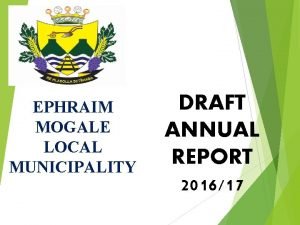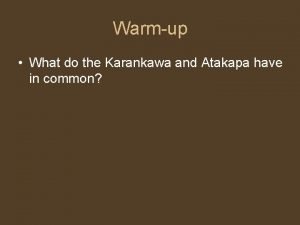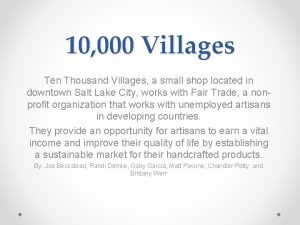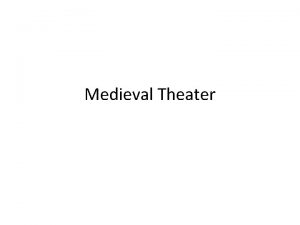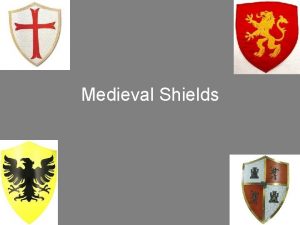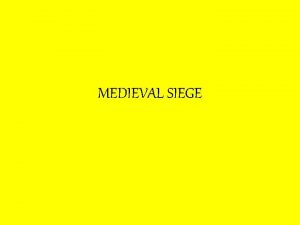Medieval England England was full of small villages






- Slides: 6

Medieval England

• England was full of small villages in the Middle Ages. Most people lived in these villages and farmed the land. Most of the land was owned by the lord of the manor, who was usually a knight. The lord let the peasants live on the land in return for them obeying him and working for him three days a week. The villeins (peasant villagers) worked very hard. They grew wheat for bread, barley for beer, oats and rye to feed the animals, vegetables and fruit. They kept sheep, pigs, goats, chickens and cows. If there was a bad harvest or their animals died of disease or cold, the villeins would starve to death. • Some of the people travelled to other villages because they had special jobs such as being a carpenter or a blacksmith, but most of them worked their entire lives in the same small village where they were born. Some peasants never even travelled to the next town, because they needed their lord’s permission to do so! Village Life

• William the Conqueror brought the first knights to England in 1066 to fight King Harold. As a reward for fighting, William gave them land. In return, they promised to spend 40 days a year fighting for him. This was called paying homage. A knight’s training would start at 7 years of age. He would probably come from a rich, noble family. As a boy he would be sent to a knight’s home to serve him for about 5 years. The page, as the boy would be known, would clean dishes, serve meals and wash clothes. He might learn to read and write. • At about 14 years old the page would become a squire. He would learn about chivalry, weapons, fighting, armour and horses. If the squire worked hard for 5 years, he would be ready to go through to his knighting ceremony. The squire would be ordered to spend a night in a church praying. In the morning a priest would bless a sword, and instruct the older knight to dub the young squire. The quire would kneel down before his master and allow the knight to touch (or dub) his shoulders with the sword. A knight was born. Knights

• To amuse themselves knights organised tournament to practice their skills. Knights would meet in a huge field, divide into two teams and spend the next few hours fighting each other. They didn’t want to kill each other so they used blunt weapons, but many knights were still killed by accident. A joust was a contest between two knights on horseback. They would ride at each other ten times and one would try and hit the other with a 3 metre long lance. Three points were awarded if he knocked his opponent off his horse, two points if he hit his helmet and on point if he hit any other part of his body. A point would be lost if he hit the horse. Some knights made a living out of winning jousting competitions. • A suit of armour was expensive but they often looked the same, so knights would paint their own family’s coat of arms on their shield so they could be recognised in ballet. Some knights would even add things to their helmets. If a knight was captured in battle he would rarely get killed because his family was valuable and his family would pay a ransom to get him freed.

• There was no police force in England in Medieval times. If you saw someone committing a crime you would shout as loudly as you could and everyone within earshot would have to help to hunt for the criminal. This was called ‘raising the hue and cry’. If the villagers didn’t help, they would be fined. When caught for a small crime the criminal would be taken to the local lord’s manor house. The lord would then decide on a punishment, which would usually be a fine. More serious crimes were dealt with by the king’s court. If the case was unclear, the king, or one of his sheriffs, would probably order a trial by ordeal. • Everyone believed in God in medieval times. They believed that God helped good people and punished bad people. Trial by ordeal was a way of allowing God to decide on someone’s guilt. There was ordeal by fire where the accused carries a red-hot iron bar for three steps, their hand is bandaged and they have to come back in 3 days. When they come back, if the wound is healed then God must think he is worth helping and so he must be innocent. If the wound is infected, God must think he is not worth healing and so he must be guilty, and punished by being put to death. There was ordeal by water, where the accused is tied up and thrown into a lake or river. If the prisoner floats, then he must be guilty, and if he sinks and drowns, then God must want him in heaven and he was innocent. Law and order

• Today we visit a doctor or a chemist if we are sick. We trust these people to make us better. They might put us on a course of drugs if they think our illness is serious. If we are cut we might use antiseptics to stop an infection. Things were different in Medieval times. Although there were doctors, most of them didn’t know much about the real causes of illness. They didn’t know that germs were the cause of disease because they had no microscopes with which to see them. There were plenty of places for germs to be found, as you can tell from the this description of a house in medieval times. • “The floors are made of clay. They are covered with rushes. Under the rushes is collection of spilt beer, grease, bones, animal droppings and everything that is nasty. ” • Medieval doctors believed that you could tell what was wrong with someone by examining their urine. He would look at its colour and use a special chart to work out what was wrong. He might even taste it! Doctors would also use the position of the stars and planets to work out the best time to treat you. Medicine




